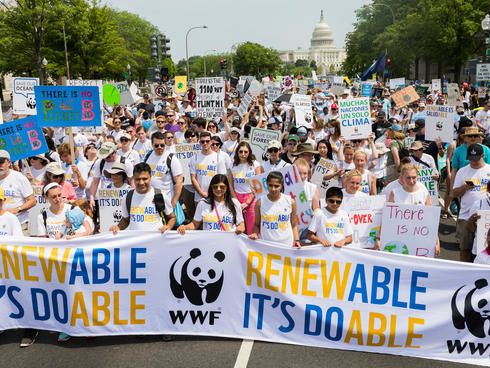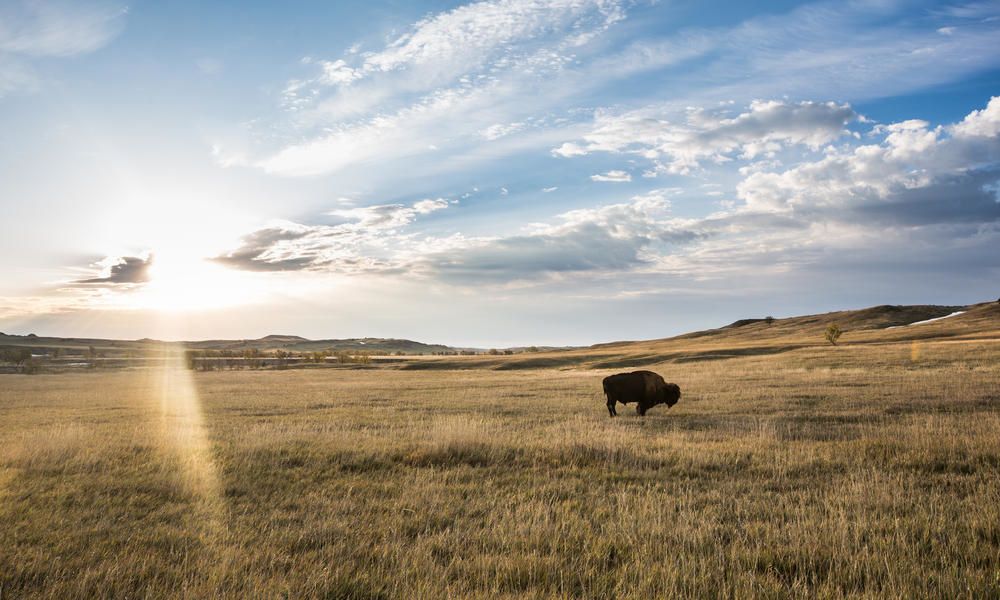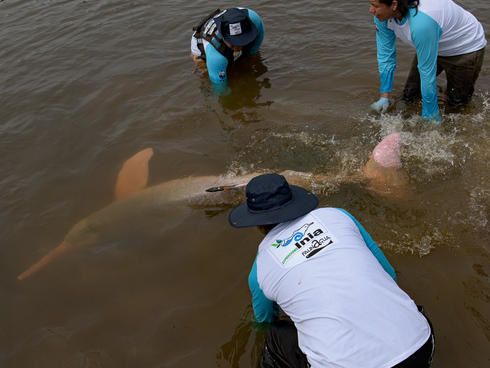

It’s been a big year for conservation.
Together we assured the world that the U.S. is still an ally in the fight against climate change through the We Are Still In movement, a coalition of more than 2,500 American leaders outside of the federal government who are still committed to meeting climate goals. WWF‘s activists met with legislators to voice their support for international conservation funding. And we ensured that Bhutan’s vast and wildlife-rich areas remain protected forever through long-term funding.
As 2017 comes to a close, we’re taking a moment to highlight some of our biggest conservation successes of the year. And we couldn’t have done it without your support.
RoschetzkyProductions / Shutterstock
Leaders across the U.S. economy reaffirmed their commitment to climate action despite the Trump administration’s decision to pull out of an unprecedented and essential international agreement to curb climate change.
Mexico committed to critical measures to save the vaquita.
The government of Mexico announced a permanent ban on gillnets in the Upper Gulf of California—a fantastic and encouraging step forward on the path to save the vaquita.
Supporters helped WWF launch an emergency plan to stop Myanmar’s elephant poaching crisis.
Amid a dire poaching crisis, wild Asian elephants in Myanmar received swift and essential aid from thousands of WWF supporters committed to protecting this iconic species. More than 3,000 people donated $263,211 in less than four weeks to fund an emergency action plan to train rangers and get boots on the ground to fight wildlife crime.
WWF-US / Keith Arnold
WWF staff and supporters stood up for conservation at the People’s Climate March.
More than 1,000 WWF activists—including more than 200 staff—joined 200,000 marchers in Washington, DC, to show they support strong action on climate change. WWF Panda Ambassadors and staff held sister marches across the country in cities including Dallas, Long Beach, Seattle, Portsmouth, Chicago and San Diego.
WWF activists made their mark on Capitol Hill by engaging leaders on conservation issues.
Through more than 60 face-to-face meetings on Lobby Day 2017, our activists shared with key legislators their concerns and hopes on topics ranging from stopping wildlife trafficking to tackling climate change.
WWF and Walmart embarked on a new effort to cut carbon pollution.
WWF and Walmart are working together to cut carbon pollution and curb some of the worst impacts of climate change to protect people and wildlife at risk with Project Gigaton.
Day’s Edge / WWF-US
WWF supporters raised more than $250,000 to help bison in Badlands National Park.
In early March, nearly 2,500 people donated a total of $256,512 to extend bison habitat at the park from 57,640 acres to 80,193 acres. This will allow the park to achieve and sustain a herd of more than 1,000 bison, and will allow more park visitors to see and learn about the U.S. national mammal.
WWF and Apple are working together to protect China’s forests.
In July, Forest Stewardship Council (FSC) certificates were awarded for more than 320,000 acres of forest land in southern China. Nearly two-thirds of the land is owned and managed by one private company, Maoyuan Company. The remainder is owned and managed by Guangxi Qinlian Forestry Company, a state government entity. The land includes semi-natural forests and forest plantations.
WWF teamed up with hotels to reduce their food waste.
WWF began working with the American Hotel & Lodging Association and its member hotels to reduce food waste. Starting with 10 hotel properties, WWF and AHLA tested waste-reduction strategies, including low-waste menu planning, staff training and education, and customer engagement. Overall, participating properties reduced food waste by at least 10 percent, and lowered food costs by three to five percent.
Emmanuel Rondeau / WWF-UK
Creating a future of forests in Bhutan.
Bhutan is one of the most important players in the global fight against climate change. Bhutan’s ranking in this regard is due to it being the only country in the world to commit to remaining carbon neutral, meaning it absorbs as much carbon dioxide as it emits into the atmosphere. And now Bhutan has a great means for bringing that commitment to life—long-term funding to ensure its protected areas, which cover half of the country, are properly managed forever. It is the first initiative of its kind in Asia and one of only a few in the world.
For the first time ever, WWF and partners tagged Amazon river dolphins to boost conservation efforts.
WWF and research partners are now tracking river dolphins in the Amazon using satellite technology after scientists successfully tagged dolphins in Brazil, Colombia and Bolivia. The small transmitters safely attached to the dolphins will provide new insights into the animals’ movements and behavior, along with the growing threats they face.
Jaime Rojo/WWF-US
Some of the world’s largest food companies announced they’ll help halt deforestation in the Cerrado.
For more than 30 years, the Amazon has been the poster-forest for the environmental movement. And deforestation in the Amazon is largely slowing down. Unfortunately, however, the Cerrado continues to lose ground to expanding beef and soy production, plus other commodities and infrastructure. In fact, losses in the Cerrado have been greater than those in the Amazon for the past decade.
The Global Mangrove Alliance united to conserve and restore valuable coastal forests.
WWF teamed up with Conservation International, the International Union for Conservation of Nature, and the Nature Conservancy to form the Global Mangrove Alliance. The alliance is an initiative to reverse the loss of critically important mangrove habitats worldwide. The target is ambitious: to expand the global extent of mangrove habitat 20 percent by the year 2030.

 233k
233k  41k
41k  Subscribe
Subscribe 




